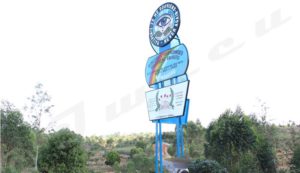The association of survivals and victims of “genocide” perpetrated against “Hutu” ethnic group people before and after 1972 has erected a memorial placard in front of the entrance of Gitega commune since the last weekend to remember people killed during that period.

The memorial placard that creates controversies was erected in Gitega Province
Local administrative officials say they have not been informed about the erection of that placard. Contacted, Venant Manirambona, Gitega Governor says he is going to get in touch with the association to know more details: “I didn’t give any permission to erect a memorial placard,” he says.
François-Xavier Nsabimana, chairman of the international association of survivals and victims of the 1972 “genocide” perpetrated against “Hutu” ethnic group, also says he is not aware of the association that fixed the placard. “They violate our rights! How could the administration allow them to build such a placard?” he wonders.
As for the Truth and Reconciliation Commission, Bishop Jean Louis Nahimana, Chairman of the commission says he is shocked to hear about the erection of that placard. “We don’t know the association that erected it”, he says. He, however, says it is normal that people defend their own rights but they should not be the judge and jury at the same time. “Burundians from “Hutu” ethnic group were victims of human rights violations as well as people from “Tutsi” ethnic group,” he says.
The chairman of the commission says Burundians should wait for the result of the commission. “We are not at the stage where people file complaints. Those who erected the placard have gone beyond the activities of the commission,” he says.
Bishop Nahimana says the commission has already finished the collection of testimonies and documentation of what happened in Burundi. “Killings, executions, abductions have been perpetrated in Burundi. All ethnic groups have been affected. The Truth and Reconciliation Commission must investigate those crimes first before qualifying them,” he says.
The law governing the Truth and Reconciliation Commission stipulates that the commission must propose a common memorial site and the date of commemoration on all crimes committed in Burundi.
The chairman of the commission calls upon Burundians to understand the sufferings of others and remember together all the victims without any distinction.
Iwacu has tried to contact the representatives of the association and the ministry of Home Affairs for more details in vain.



















 IWACU Open Data
IWACU Open Data

